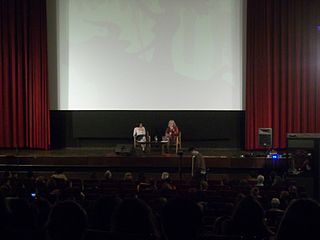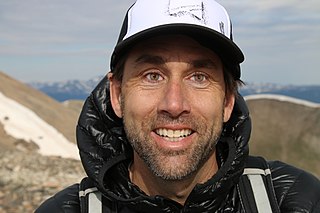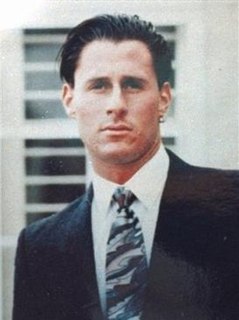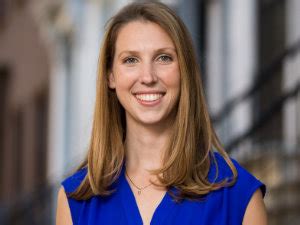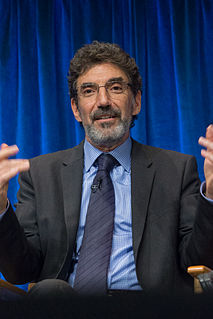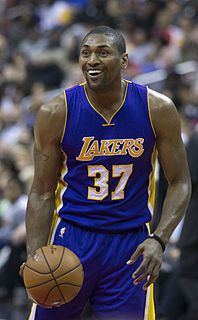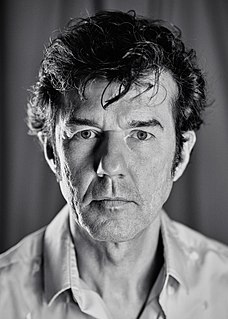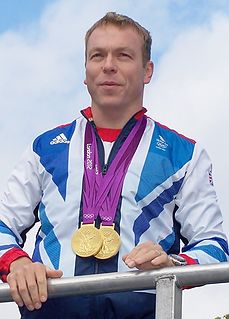Top 239 Psychologist Quotes & Sayings - Page 4
Explore popular Psychologist quotes.
Last updated on December 18, 2024.
In the high school classroom you are a drill sergent, a rabbi, a shoulder to cry on, a disciplinarian, a singer, a low-level scholar, a clerk, a referee, a clown, a counselor, a dress-code enforcer, a conductor, an apologist, a philosopher, a collaborator, a tap dancer, a politician, a therapist, a fool, a traffic cop, a priest, a mother-father-brother-sister-uncle-aunt, a bookeeper, a critic, a psychologist, the last straw.
There is a wonderful book called "Gandhi's Truth," by Erik Erikson, the psychologist. It is a great book. And I remember reading that and thinking about this connection between what we think in our personal lives and how that manifests itself in our politics. Those are two books, just off the top, that I think are sort of representative of reading that I did at that time. I never get a chance to read anymore.
Astrology is of particular interest to the psychologist, since it contains a sort of psychological experience which we call projected - this means that we find the psychological facts as it were in the constellations. This originally gave rise to the idea that these factors derive from the stars, whereas they are merely in a relation of synchronicity with them. I admit that this is a very curious fact which throws a peculiar light on the structure of the human mind.
Well, if you’re a native Chicagoan, you know how dumb he [Dr. Robert Hartley] is. He gets on the Ravenswood El, he goes past his stop on Sheridan Road, he gets off in Evanston, where the El is on the ground, and then he walks back 55 blocks to his apartment. Now, would you want to have that man as a psychologist? A man who misses his stop every day?
According to this woman, who requested anonymity because of her current job as a clinical psychologist, "He and Randy came to my house, they knocked on my door, and then they blindfolded me, tied me up, and put me in their car. They took me to their apartment and tried to force me to take bong hits. They'd been smoking pot."
A friend, who's a psychologist, told me about a patient once: a woman who was well educated, had a good job, a house and a loving husband. "I did everything right in my life," said the woman. "But I'm still not happy." She never did what she herself wanted, but what she believed society expected from her.
My mother finally took me to a child psychologist, who knew exactly what I was, but she just couldn’t accept it and kept trying to tell my folks I was reading their body language and was very observant, so I had good reason to imagine I heard people’s thoughts. Of course, she couldn’t admit I was literally hearing people’s thoughts because that just didn’t fit into her world.
So if somebody has chronic pain, we want to manage the pain, but we still want to treat the insomnia separately. So what we'll tend to do in our sleep lab is we'll do a thorough evaluation and we usually have myself, who is a Psychologist and a Sleep Behavioral Sleep Specialist, I treat the patients first.
One of the most common words in the invalidating, self-blaming stories we believe about ourselves or our situations is the word "should." The psychologist Albert Ellis has coined the phrase "Stop shoulding on yourself." When you tell yourself that you should feel or be another way, you are likely to feel bad about yourself. As an alternative, try telling yourself that it is okay to feel or be the way you are, even though you have some idea that you should feel or be different.
I decided to become a teacher because I thought it would be a great career where I could wear different hats. You're an academic one moment, and you're a psychologist the next moment, an athlete the next moment... when you are out on the playground or coaching...so it enables you to play different roles.
When a philosopher, scientist, or psychologist discusses the discrepancy between the actual and the ideal, he or she attempts to convince us with the tools of discursive thought ... An artist does it differently ... their primary approach is different, even though both groups, if you will, are investigating the actual, the ideal, and the discrepancy in between.
A doctor, like anyone else who has to deal with human beings, each of them unique, cannot be a scientist; he is either, like the surgeon, a craftsman, or, like the physician and the psychologist, an artist. This means that in order to be a good doctor a man must also have a good character, that is to say, whatever weaknesses and foibles he may have, he must love his fellow human beings in the concrete and desire their good before his own.
The complete novelist would come into the world with a catalog of qualities like this. He would own the concentration of a Trappist monk, the organizational ability of a Prussian field marshal, the insight into human relations of a Viennese psychologist, the discipline of a man who prints the Lord's Prayer on the head of a pin, the exquisite sense of timing of an Olympic gymnast, and by the way, a natural instinct and flair for exceptional use of language.
The social psychologist of the future will have a number of classes of school children on whom they will try different methods of producing an unshakable conviction that snow is black. When the technique has been perfected, every government that has been in charge of education for more than one generation will be able to control its subjects securely without the need of armies or policemen.
Each home has been reduced to the bare essentials -- to barer essentials than most primitive people would consider possible. Only one woman's hands to feed the baby, answer the telephone, turn off the gas under the pot that is boiling over, soothe the older child who has broken a toy, and open both doors at once. She is a nutritionist, a child psychologist, an engineer, a production manager, an expert buyer, all in one. Her husband sees her as free to plan her own time, and envies her; she sees him as having regular hours and envies him.
There seems to be something in the zeitgeist, and maybe it's a function of - I'm no analyst, nor am I a psychologist - when you look at things and say, What if I could go back and change things? I think we live in a world right now where people are asking those questions a lot. What if we could go back and change what we did? How would we change the way we handled things in the Middle East, and how would we change things with the banking industry, and how would we change economic and educational issues?
By instructing students how to learn, unlearn and relearn, a powerful new dimension can be added to education. Psychologist Herbert Gerjuoy of the Human Resources Research Organization phrases it simply: 'The new education must teach the individual how to classify and reclassify information, how to evaluate its veracity, how to change categories when necessary, how to move from the concrete to the abstract and back, how to look at problems from a new direction — how to teach himself. Tomorrow's illiterate will not be the man who can't read; he will be the man who has not learned how to learn.'
As a Jew and a psychologist, I understand the stress that religious communities feel in connection with questioning of circumcision... I raise these questions out of deep caring and compassion, for our community generally, and our male infants in particular. We are inflicting, generally, unrecognized harm with circumcision, and the perpetuation of this harm is far greater a concern than the discomfort that comes from confronting the advisability of this practice. Many Jews who do not circumcise in North America, South America, Europe, and Israel support this view.
I try to come to my reporting as a real, whole person, not an automaton. And it's always one of the strange discomforts of the job, that you're in this very intense moment in someone's life - you're engaging with them nonstop - and then suddenly your piece is out and that's done. It always reminds me that the journalist's job isn't to be someone's friend, or their psychologist, or anything other than what we actually are. And at the end of the day, that can definitely seem like such a strange, extractive relationship.
There always comes, I think, a sort of peak in suffering at which either you win over your pain or your pain wins over you, according as to whether you can, or cannot, call up that extra ounce of endurance that helps you to break through the circle of yourself and do the hitherto impossible. That extra ounce carries you through 'le dernier quart d' heure.' Psychologist have a name for it, I believe. Christians call it the Grace of God.
I exercise regularly. I eat moderate amounts of healthy food. I make sure to get plenty of rest. I see my doctor once a year and my dentist twice a year. I floss every night. I've had chest x–rays, cardio stress tests, EKGs and colonoscopies. I see a psychologist and have a variety of hobbies to reduce stress. I don't drink. I don't smoke. I don't do drugs. I don't have crazy, reckless sex with strangers. If Charlie Sheen outlives me, I'm gonna be really pissed.
As a skilled psychologist, Dr. Reznick draws from her wealth of experience to offer children and parents a treasure trove of skills to relieve stress. She presents well-written, easy-to-follow tools to use in every situation. From visualization techniques to breathing exercises, Dr. Reznick taps the power of a child's imagination to ensure kids achieve peace and success.
A well-known magazine asks a man how they should refer to him, as Psychologist X, as Author X? He suggests man of letters, for that is what he is, in the eighteenth-century meaning. But they can't buy that because the word doesn't exist in Time-style; he cannot be that, and presumably the old function of letters cannot exist.
Psychologists would say that the only two important forms of social learning are imitation and teaching, and they will spend time trying to figure out if animals imitate or teach. Sometimes they find they do; sometimes they find they don't. And so that's kind of the level of controversy there. Biologists would include imitation and teaching and a range of other kinds of social learning. So we would call that culture, whereas the psychologist wouldn't.
We also have this reflex of using specialists for everything, instead of having the person who is there every day with them, the teacher, talk about death and suicide. In the film, it's portrayed a little bit like a caricature, but it's the psychologist who comes in and Monsieur Lazhar does not think it's a good idea. He thinks he should be the one who should talk about that with the children.
Most people tell you they want to get out of kindergarten, but don't believe them. Don't believe them! All they want you to do is to mend their broken toys. "Give me back my wife. Give me back my job. Give me back my money. Give me back my reputation, my success." This is what they want; they want their toys replaced. That's all. Even the best psychologist will tell you that, that people don't really want to be cured. What they want is relief; a cure is painful.
Being a lifetime wife and mother has afforded me the luxury of having multiple careers: I've been a teacher. A chauffeur. A chef. An interior decorator. A landscape architect, as well as a gardener. I’ve been a painter. A personal shopper. An accountant and a banker. I’ve been a beautician. Santa Claus. The Tooth Fairy. A movie reviewer. A nurse. A psychologist. A negotiator. An I have a Ph. D in How to Pretend Like You Don’t Mind.
It is only by demanding the impossible of the piano that you can obtain from it all that is possible. For the psychologist this means that imagination and desire are ahead of the possible reality. A deaf Beethoven created for the piano sounds never heard before and thus predetermined the development of the piano for several decades to come. The composer's creative spirit imposes on the piano rules to which it gradually conforms. That is the history of the instrument's development. I don't know of any case where the reverse occurred.
My clinical psychologist wife of 40 years has always had a close intellectual influence on me. When I was beginning to talk openly in the economics profession about irrationality in decision-making, I received a lot of criticism. Ginny would support my views and remind me that a whole other profession - psychology - studies people's irrational sides.
U.K. psychologist Daniel Nettle thinks of happiness as a carrot on a stick, designed by evolution to show the right way, and also designed so that we will never permanently reach it. We likely would just sit around and eat sweet and fatty foods all day, and that is simply not in the interest of evolution.
Of course, a psychologist would find it more direct to study the inspired poet. He would make concrete studies of inspiration in individual geniuses. But for all that, would he experience the phenomena of inspiration? His human documentation gathered from inspired poets could hardly be related, except from the exterior, in an ideal of objective observations. Comparison of inspired poets would soon make us lose sight of inspiration.
I keep on repeating something told to me by an American psychologist: "When you are making a joke about someone and you are the only one to laugh, it is not a joke. It is a joke only for yourself." If people are making a joke they have the right to laugh at me but I will ignore them. Ignoring doesn't mean that you don't understand. You understand it so much that you don't want to react.
Psychologist Nathaniel Branden speaks of a benevolent sense of life possible to those with rational, productive values, vividly contrasted with the coercive parasitic group-culture of mystics and altruists we live in, where people all around you seem a burdensome annoyance, a threat to your survival. Having been told from childhood that life is a zero-sum game in which you owe everything to others, at some level you worry all the time that someday the bastards will collect. And collect they do, every April 15th. Why do you think they call it collectivism?
A psychologist once asked a group of college students to jot down, in thirty seconds, the initials of the people they disliked. Some of the students taking the test could think of only one person. Others listed as many as fourteen. The interesting fact that came out of this bit of research was this: Those who disliked the largest number were themselves the most widely disliked. When we find ourselves continually disliking others, we ought to bring ourselves up short and ask ourselves the question: "What is wrong with me."
I'm not a psychologist, and I don't know how to play a more sophisticated role than the one that I have played for quite a few years, and that is spending a lot of time with these hard-working scientists in the various fields of expertise that relate to the climate crisis, learning as fully as I can the truths they are discovering, asking them to explain it in language that's simple enough for me to understand and then use that language to convey the essence of it, and then letting the chips fall where they may.
Westerners often laud their children as 'talented' or 'gifted', while Asian parents highlight the importance of hard work. And in fact, research performed by Stanford psychologist Carol Dweck has found that the way parents offer approval affects the way children perform, even the way they feel about themselves.
I consider Otto Rank to be one of the great spiritual giants of the twentieth century, a genius as a psychologist and a saint as a human being. Though vilified by his original community of Freudians, he never became bitter. He died a feminist and deeply committed to social justice, in 1939....His deep understanding of creativity makes him a mentor for all of us living in a postmodern world....I believe that Art and Artist, especially chapters 12 to 14, may well emerge as the most valuable psychoanalysis of the spiritual life in our time.
I worked closely with Steve Peters, the British Cycling team's psychologist, and we came up with a strategy of dealing with the pressure. It basically involved displacing the negative thoughts with visualisation. Not a complicated technique, but very effective if done properly. I just kept running through the race in my head over and over so that I wouldn't let the distractions around me put me off.
After my husband, Dave, died, I called my friend Adam, a psychologist who studies how people find meaning in our lives, and I asked him what, if anything, I could do to help myself and my kids get through this. We started talking about resilience, then reading about it, then talking to other people who had gotten through grief and other huge challenges. In time, those conversations and that research helped me heal.
The particular skill that allows you to talk your way out of a murder rap, or convince your professor to move you from the morning to the afternoon section, is what the psychologist Robert Sternberg calls "practical intelligence." To Sternberg, practical intelligence includes things like "knowing what to say to whom, knowing when to say it, and knowing how to say it for for maximum effect.
Wise, compassionate and accessible, David Benner's The Gift of Being Yourself is truly a gift to the dedicated seeker. The author draws on his professional experience as a psychologist and his own lifelong vocation as a Christian. The result is a book that felicitously weaves together the insights of psychology and Christian spirituality.
In fact, on one occasion, a rather pedantic experimental psychologist was telling him about a long, complicated experiment he had done, incorporating all the proper controls and using considerable technical virtuosity. When he saw Crick's exasperated expression he said, "but Dr. Crick, we have got it right - we know it's right," Crick's response was, "The point is not whether it's right. The point is: does it even matter whether its right or wrong?"
Hayek made a quite fruitful suggestion, made contemporaneously by the psychologist Donald Hebb, that whatever kind of encounter the sensory system has with the world, a corresponding event between a particular cell in the brain and some other cell carrying the information from the outside word must result in reinforcement of the connection between those cells. These day, this is known as a Hebbian synapse, but von Hayek quite independently came upon the idea. I think the essence of his analysis still remains with us.
When love doesn't work, we hurt. Indeed, “hurt feelings” is a precisely accurate phrase, according to psychologist Naomi Eisenberger of the University of California. Her brain imaging studies show that rejection and exclusion trigger the same circuits in the same part of the brain, the anterior cingulate, as physical pain.
I am always impressed by the fact that even the tiniest amount of being listened to, the barest suggestion of the possibility of kind treatment, can bring such an immediate rush of emotion. I think this is because we are almost never really listened to. In my work as a psychologist, I am reminded every day of how infrequently we are heard, any of us, or our actions even marginally understood. And one of the ironies of my "listening profession" is its lesson that, in many ways, each of us ultimately remains a mystery to everyone else.
In ordinary speech the words perception and sensation tend to be used interchangeably, but the psychologist distinguishes. Sensations are the items of consciousness--a color, a weight, a texture--that we tend to think of as simple and single. Perceptions are complex affairs that embrace sensation together with other, associated or revived contents of the mind, including emotions.
Having kids has proven to be this amazing - for me, this amazing source of ideas of anecdotes, of examples, I can test my own kids without human subject permission, so they pilot - I pilot my ideas on them. And so it is a tremendous advantage to have kids if you're going to be a developmental psychologist.
All that self-control stuff, I tried all that stuff from analysts. I went everywhere to these guys, every kind of anger-management, psychologist, psychiatrist. 'Get rid of my temper, get rid of my temper.' And there was only one guy who just said, 'I don't think this is related to, uh, issues. I think there has got to be something wrong.'








